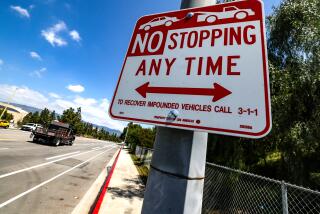Drivers in Russia Hate Their New Lot in Life
- Share via
MOSCOW — Car bombs, speed demons and potholes wide enough to swallow a whole chassis have been menacing Moscow motorists since the collapse of communism, but nothing outrages drivers like the latest peril: the meter maid.
The Russian version bears little resemblance to Lovely Rita of Beatles fame; here, pay-lot attendants and tow-truck operators tend to pack pistols along with their ticket books. And parking patrol officers clad in phony army or police uniforms have earned the public’s enmity with unscrupulous tricks.
But the howls heard at empty curbsides are just as often induced by the shocks of a capitalist system that this city of 10 million is still getting used to.
“They charged me a million rubles [about $175] for what they called ‘services.’ I didn’t ask to be served!” fumed Leonid Koshelev, a 48-year-old businessman whose car was towed from teeming Novy Arbat Street while he ducked into a pharmacy.
City officials recently ordered the towing of cars that park without advance payment, saying the action is necessary to ease traffic congestion and generate revenue.
The number of cars in Moscow has more than tripled over the past decade; the vehicles have jammed streets and sidewalks as drivers have become accustomed to leaving them wherever convenient.
In keeping with this capital’s penchant for creating new chaos with each endeavor toward order, the advent of paid parking--and of towing--has deployed a fresh army of shakedown artists along with legitimate attendants. And it has confronted drivers with what many say amounts to officially authorized extortion.
Take, for example, the row of diagonal parking spots flanking the Oasis Casino, a raucous nightspot near Red Square that is directly across from the Duma, the lower house of parliament. The section is not among the 150 stretches of street side leased to private security firms by the city, but try telling that to the Kalashnikov-toting guard who greets drivers with his hand out.
Outside popular restaurants such as the Santa Fe Tex-Mex eatery or the tony Brasserie du Soleil, men in camouflage with fake police badges warn entering diners that the charge for protection of their cars is 10,000 rubles ($1.75) an hour.
Even outside federal government buildings, such as the Foreign Ministry Press Center on Zubovsky Boulevard, paid parking has arrived with studiously minimal fanfare. After a news conference held there by President Boris N. Yeltsin’s chief of staff late last year, dozens of foreign journalists returned to the curb to find their cars immobilized by red metal clamps.
A private security firm’s attendant, who had turned the pay-lot sign backward when the drivers arrived and then hidden in nearby shrubbery, suddenly materialized to free the autos--for 10 times the usual hourly rate.
Bustling Moscow’s decision to charge for prime parking space might seem logical to Western drivers, but the notion of paying for something that once was free is getting a cold reception here.
Russia’s car culture is still emerging; until a decade ago, automobile ownership was restricted to a privileged minority of Communist Party bigwigs and loyalists. In the Soviet era, citizens had to wait years to buy a shoddy domestic Zhiguli or Moskvich priced at about five years’ pay.
But Moscow’s rolling stock has grown by 800,000 cars since 1993, and by twice that figure since imports were first allowed in the late 1980s. And with 2.1 million registered vehicles in the city today, parking infractions have soared, complains Viktor V. Vorobiev, the city official responsible for paid parking and impoundment.
Complaints about absent attendants dominate the flame mail sent to city fathers, possibly because meters and pay boxes are a rarity here. Local leaders have decided that human patrolling is the only reliable means of collecting payment.
The city first tried installing 200 parking meters along bustling Tverskaya Street, the main shopping thoroughfare leading from Red Square. But angry motorists poured water into the metal meters so they would freeze into irrelevance for the winter.
Tickets were short-lived too. No one paid them, and enforcement is impossible in a city where licenses and registrations have yet to be logged into computers.
“The mentality of our people is something completely alien on this subject, because in our Soviet era, there was no such thing as paid parking or impoundment,” Vorobiev says. “But something had to be done. Our streets are strangled by the volume of cars.”
By designating 150 areas for paid parking, the city expects to earn 46 billion rubles from parking fees this year, or about $8 million. While that sum might seem small for such a huge city, salaries are far lower for Muscovites--often less than $200 a month--than for urban Westerners.
Officials are also counting on revenue from an anticipated 250,000 impounds, each of which grosses the tow company about $177, although how much of that makes its way to city coffers is uncertain.
Mayor Yuri M. Luzhkov decreed rules for “blocking and evacuation” nearly two years ago, and when the first city-patrolled parking areas appeared last year, Muscovites became acquainted with a crude version of the Denver boot--the red clamps.
Drivers last fall spearheaded a campaign against clamping, persuading a municipal court that the practice was doing nothing to ease traffic congestion.
In a response that reminded Muscovites to be careful what they wish for, Luzhkov rescinded the clamping order in December and decreed that all illegally parked cars be impounded.
Since then, more than 100 vehicles a day have been towed to four impoundment lots, leaving disfranchised drivers clutching both their hearts and their wallets.
“I thought I was going to have a heart attack when I came out of the store and saw that my car was gone,” says Galina Prokofiev, a 39-year-old homemaker.
It took her two days to liberate the vehicle in a process that required trips to traffic police headquarters, to a notary public and to the impound lot--twice.
Some officials have parted ways with the unruly practices, including City Councilman Viktor A. Maximov, who contends that paid parking is becoming sanctioned extortion.
“Anything can be arranged to justify injustice in this city--anybody living here knows that,” he says, pointing out a favorite police practice of retroactively authorizing impoundments.
Traffic cops in Moscow already have ample means of making money from errant motorists and careless parkers.
An “Operation Foreigner” campaign of harassment was declared in January in retaliation for a parking incident involving a Russian diplomat in New York City.
Moscow police seized driver’s licenses and even registration plates from cars that were stopped for spot inspections, holding them for ransom on the pretext that the vehicles were “unroadworthy.”
The Times lost a Lada sedan for three days--and spent $120 to get it back--because it had a small dent in the front fender.
Moscow drivers have long taken the abuses of their notorious traffic police in stride, and so contempt for pay lots and towing may eventually give way to familiarity.
“We’ve been called bandits, bloodsuckers, racketeers and lazybones,” says an amused Alexei Feldsherov, an attendant for the Attika security company that patrols three pay lots in central Moscow.
“But little by little,” says the broad-shouldered bruiser with a buzz cut, “people are getting used to the new situation, and now most of them are willing to pay.”
More to Read
Sign up for Essential California
The most important California stories and recommendations in your inbox every morning.
You may occasionally receive promotional content from the Los Angeles Times.













